
Since Hawaii became a state in 1959, it has sent congressional delegations to the United States Senate and United States House of Representatives. Each state elects two senators to serve for six years. Members of the House of Representatives are elected to two-year terms, one from each of Hawaii's congressional districts. Before becoming a state, the Territory of Hawaii elected a non-voting delegate at-large to Congress from 1900 to 1958.
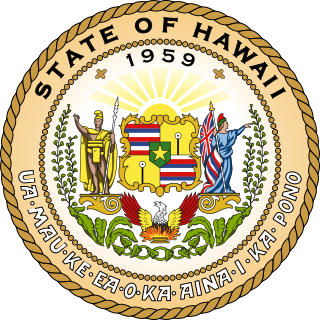
The Hawaii State Legislature is the state legislature of the U.S. state of Hawaii. The state legislature is a bicameral body consisting of a lower house, the Hawaii State House of Representatives, with 51 representatives, and an upper house, the 25-member Hawaii State Senate. There are a total of 76 lawmakers in the legislature, each representing single member districts across the islands. The powers of the legislature are granted under Article III of the Constitution of Hawaii. The legislature convenes at the Hawaii State Capitol building in the state capital of Honolulu, on the island of Oahu.
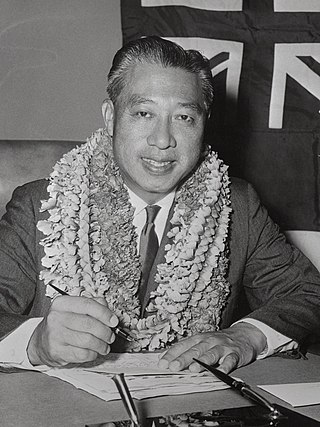
Hiram Leong Fong was an American businessman, lawyer, and politician from Hawaii. Born to a Cantonese immigrant sugar plantation worker, Fong was one of the first two senators for Hawaii after it became the 50th US state in 1959. He was the first Chinese-American and first Asian-American United States Senator, serving from 1959 to 1977.
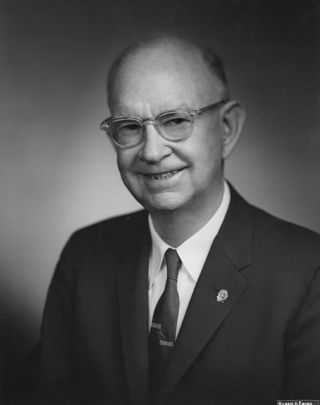
Oren Ethelbirt Long was an American politician who served as the tenth Territorial Governor of Hawaii from 1951 to 1953. A member of the Democratic Party of Hawaii, Long was appointed to the office after the term of Ingram Stainback. After statehood was achieved he served in the United States Senate, one of the first two, along with Hiram Fong, to represent Hawaii in that body. Long was the only non–Asian American U.S. Senator from Hawaii until the appointment of Brian Schatz to the position in 2012.

Patsy Matsu Mink was an American attorney and politician from the U.S. state of Hawaii. She served in the United States House of Representatives for 24 years as a member of the Democratic Party, initially from 1965 to 1977, and again from 1990 until her death in 2002. She was the first woman of color and the first Asian-American woman elected to Congress, and is known for her work on legislation advancing women's rights and education.

Honolulu City Council is the legislature of the City and County of Honolulu, the capital and largest city in Hawai'i, the fiftieth state in the United States. The City and County of Honolulu is a municipal corporation that manages government aspects traditionally exercised by both municipalities and counties in other states. Each of the nine members of its city council is elected to a four-year term and can serve no more than two consecutive terms. Council members are elected by voters in nine administrative districts that, since 1991, are reapportioned every ten years. Like the Honolulu mayor, members of the city council are elected via nonpartisan elections.

The Hawaii State Senate is the upper house of the Hawaii State Legislature. It consists of twenty-five members elected from an equal number of constituent districts across the islands and is led by the President of the Senate, elected from the membership of the body, currently Ron Kouchi. The forerunner of the Hawaii Senate during the government of the Kingdom of Hawaii was the House of Nobles originated in 1840. In 1894, the Constitution of the Republic of Hawaii renamed the upper house the present senate. Senators are elected to four-year terms and are not subject to term limits.
Hawaii's 2nd congressional district is a congressional district in the U.S. state of Hawaii. It is represented by Jill Tokuda, who succeeded Kai Kahele after the 2022 election. The district encompasses all rural and most suburban areas of Oahu/Honolulu County, as well as the entire state outside of Oahu. It includes the counties of Kauai, Maui, Kalawao, and Hawaii. The district spans 331 miles. The most populous community entirely within the district is Hilo. Major segments of the economy include tourism, ranching, and agriculture.

The Hawaii Republican Party is the affiliate of the Republican Party (GOP) in Hawaii, headquartered in Honolulu. The party was strong during Hawaii's territorial days, but following the Hawaii Democratic Revolution of 1954 the Democratic Party came to dominate Hawaii. The party currently has little power and is the weakest state affiliate of the national Republican Party; it controls none of Hawaii's statewide or federal elected offices and has the least presence in the state legislature of any state Republican party.

The Hawaiian Organic Act, Pub. L.Tooltip Public Law 56–339, 31 Stat. 141, enacted April 30, 1900, was an organic act enacted by the United States Congress to establish the Territory of Hawaii and to provide a Constitution and government for the territory. The Act was replaced by the Hawaii Admission Act on August 21, 1959, when the territory was admitted to the Union as the State of Hawaii.
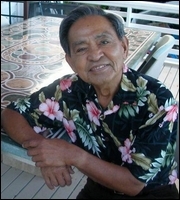
Peter Aquino Aduja was the first Filipino American elected to public office in the United States. He was elected as a representative in the Hawaii Legislature in 1954.

Elections in Hawaii are held for various local, state, and federal seats in the state of Hawaii. Regular elections are held every even year, although special elections may be held to fill vacancies at other points in time. The primary election is held on the second Saturday in August, while the general election is held on Election Day, which is the first Tuesday after the first Monday in November.
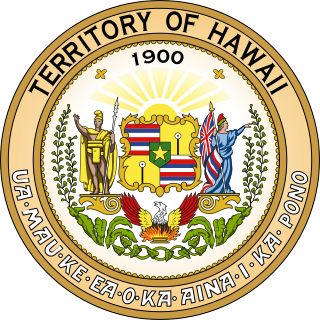
The Hawaii Territorial Legislature was the legislative body of the Territory of Hawaii from 1900 to 1959.

The 2014 United States House of Representatives elections in Hawaii were held on Tuesday, November 4, 2014 to elect the two U.S. representatives from the state of Hawaii, one from each of the state's two congressional districts. The elections coincided with the elections of other federal and state offices, including an election for Governor of Hawaii and a special election to the United States Senate.

The 2020 United States House of Representatives elections in Hawaii was held on November 3, 2020, to elect the two U.S. representatives from the state of Hawaii, one from each of the state's two congressional districts. The elections coincided with the 2020 U.S. presidential election, as well as other elections to the House of Representatives, elections to the United States Senate and various state and local elections. The state's primary elections were held on August 8, 2020.

The 2022 United States House of Representatives elections in Hawaii were held on November 8, 2022, to elect the two U.S. representatives from the state of Hawaii, one from each of the state's two congressional districts. The elections coincided with other elections to the House of Representatives, elections to the United States Senate and various state and local elections.
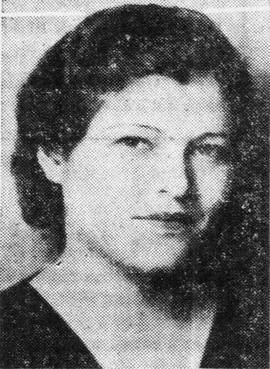
Thelma Alice Kalaokona Moore Akana Harrison was an American public health nurse and politician who served as a Republican Senator for Oahu in the Hawaii Territorial Legislature. She was the first woman to be reelected to the Territorial Senate.
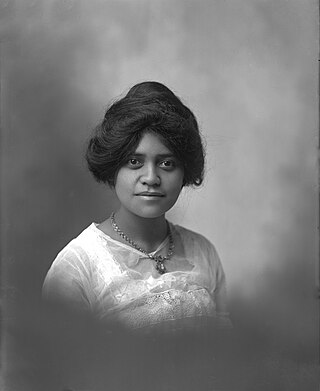
Flora Kekulalani Kaai Hayes was a Hawaiian-American politician and actor. She served in the Hawaii Territorial House of Representatives for seven terms between 1938 and 1959, representing Oahu as a member of the Hawaii Republican Party. From the 1920s through the early 1930s, Hayes became involved in various Hawaiian organizations. In 1936, she was elected president of the Territory of Hawaii's parent–teacher association (PTA), serving two terms. At the request of John Ford, she stopped in Hollywood while traveling back from a PTA conference in Virginia to play a minor role in the 1937 film The Hurricane.

The 2022 Hawaii Senate elections were held on November 8, 2022, to elect senators in all 25 districts of the Hawaii Senate. Due to the chamber's use of the 2-4-4 term system, members were elected in single-member constituencies, with half of them serving two-year terms and the other half serving four-year terms. These elections were held concurrently with various federal and state elections, including for governor of Hawaii. Partisan primaries were held on August 13.
The election of women to the Hawaii Territorial Legislature was a complex process. Women did not have the right to vote in the Republic of Hawaii after the overthrow of the Hawaiian Kingdom. Upon the passage of the Nineteenth Amendment to the United States Constitution, women gained suffrage almost immediately began seeking election to the Territorial Legislature, but the Hawaiian Organic Act dictated that only "a male citizen of the United States" could hold territorial office.
















